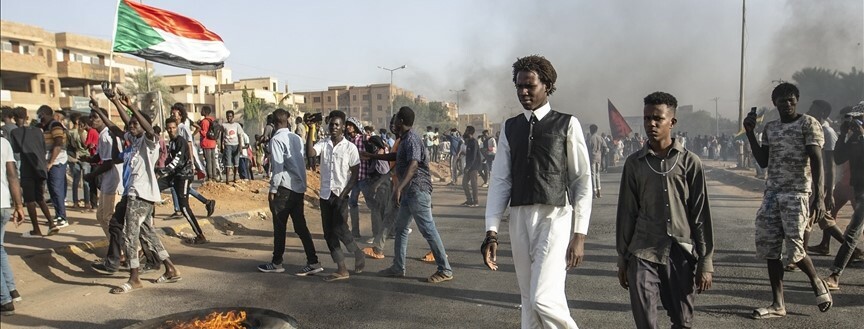Al-Tayyib Ibrahim, the leader of the Radical Change Forces in Sudan’s Darfur Region has said the people of Sudan should be engaged in finding solutions to end the ongoing war because the warring parties, the Sudan Armed Forces (SAF) and the paramilitary Rapid Support Forces (RSF), both aim to scuttle civilian rule by block the December Revolution.
He says a year has passed since the war erupted in the country, leaving several casualties among civilians, in addition to significant numbers of internally displaced persons and refugees. The country has been transformed into a pile of rubble by the war with widespread destruction of public and private facilities.
In an exclusive interview with Radio Tamazuj, Ibrahim, whose political outfit has remained neutral in the conflict, says all forms of government services have been suspended, and as armed confrontations escalate, political polarization of the political elite has intensified and political forces have aligned themselves with the two warring factions while others have declared neutrality, including the Radical Change Forces.
Below are edited excerpts:
Question: Are there imminent prospects to end the war?
Answer: We should not talk about the end of the war without considering the idea of the involvement of the Sudanese people in all its spectra in convincing them about the importance of peace. The complexities of the current war have involved many actors and sectors of the masses, including armed movements, in addition to the external factors represented by regional and international actors.
Therefore, the crisis seems more complicated than drawing clear timelines for the prospects of the end of the war. This can be observed from the contexts of the crisis and the overlapping alliances, including international circles in the Security Council and the United Nations, among others. In addition, there is a clear determination on the part of the warring parties to continue towards more violence.
Q: Given the extensions and alliances of the parties to the conflict momentarily, what form do you expect the settlement of the conflict to take?
A: There will certainly be negotiations one day and it is necessary to point out that there is not much difference between the two conflicting parties as their goal together is the desire for power and the pursuit of blocking the December Revolution.
Therefore, the forthcoming settlement will be between the warring parties and their civilian allies, whether they are Islamists, their armed factions, or the other groups representing the revolution that was in power and was overthrown by the military.
It is therefore inconceivable that the settlement will be between these civilian wings and their supporters or allies on both sides of the conflict.
Q: Where does the revolution stand in the priorities of the masses?
A: The aftermath of the war and the fragmentation and polarization of the Sudanese people between the poles of war did not occur randomly, but there are interests governing these divisions. Anyone who takes a position with one side of the war against the other is standing by his interests which are far from the interests of the December Revolution.
Confusion among some segments of the masses may ultimately lead to alignment with self-interests more than any other national interests. As for the priorities of the revolution, they are clear and it is to regain the path of the December Revolution, whose spark is still burning in the hearts of the revolution’s youth, resistance committees, civil society, trade unions, and political parties, and all the masses who have an interest in removing the military institution from the political scene.
The revolution still represents the utmost priority for it and it is now trying to prepare its tools in every possible way and works to expose the practices of the military and their ongoing violations on both sides, including looting, rape, and arrests of Sudanese citizens.
It should be noted that the conditions are still favorable for organization and broad front work which may be delayed here and there but is ongoing in forming a broad civil front with clear transitional and strategic programs.
Q: To what extent will the revolutionary vanguard be ready, the moment the war stops, to propose a democratic transformation program?
A: Revolutionary programs exist and are proposed, including the Democratic Transformation Program, Radical Change, and Democratic Alternative. There are also charters proposed, including the People’s Authority Charter and the Radical Change Charter, which are compatible with the next stage. However, these are the basic programs of the revolution from which the Declaration of Freedom and Change emerged.
It is possible to agree on the minimum of these programs to move towards the democratic transformation that passes through a transitional period, then a constitutional conference, and then elections that lead to democratic civilian rule. These programs are not bound by war, dictatorship, or any other developments that may occur in the Sudanese political scene.
Q: Are there forces that may seek to obstruct the path of the revolution as you perceive it?
A: The soft landing institutions heralded by America since the fall of Al-Bashir which led to the formation of a partnership with the military will try as much as possible to enter into the ongoing settlement now.
Therefore, it is necessary to warn of the existence of two paths: The path of settlement, which aims to block the revolution, and another path, which is the path of the revolution, which includes the masses of the Sudanese focused on the revolution and all those who have an interest in removing the military from the political scene.
Attempts at soft landing will continue to obstruct the revolution and we will see attempts at settlement while repression continues. In contrast, the struggle will continue until the revolution triumphs.




